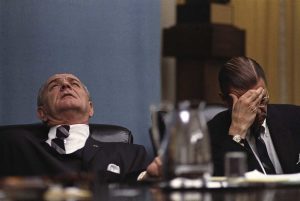
President Biden, fighting for peace
Those old enough to remember the tumultuous year 1968, or who have studied the events of that year, know that it was an earthquake in American politics, changing the course of the nation and the world. Overhanging everything was dissatisfaction with the U.S. involvement in the Vietnam War, which had been growing for several years. 1968 began with the Tet Offensive by North Vietnamese and Viet Cong forces, which, though ultimately unsuccessful, inflicted many U.S. casualties and helped turn American public sentiment further against the war. On March 31, incumbent U.S. President Lyndon Johnson, facing criticism of the war effort from all sides, shockingly announced that he was ending his presidential re-election campaign. Just four days later, civil rights leader Rev. Martin Luther King Jr. , who preached nonviolent civil disobedience, was assassinated, leading to a further tearing of the fabric of our society. In June, Democratic presidential challenger Robert F. Kennedy, who based his campaign on criticism of Johnson over Vietnam, was also assassinated. By then, America had turned into a powder keg of unrest. In August, when the Democrats held their national convention in Chicago, things turned even worse, as police brutally assaulted antiwar protesters outside, while Democratic candidates and their supporters clashed politically inside the hall. As a result, Republican Richard Nixon, shrewdly campaigning on “law and order,” rode to victory.
A number of Republicans, media outlets, and even sometimes Democratic Party friend Bernie Sanders, are trying to draw parallels between 2024 and 1968. That is because currently, on the far left, there are university protests against President Joe Biden‘s support of America’s ally Israel in its war against terrorist group Hamas. Republicans, unsurprisingly, are exploiting these protests, with which they completely disagree, in order to play up criticism of President Biden and sow social disorder, which they hope could lead to a 1968-style GOP election victory. The news media, meanwhile, are more than happy to air lots of footage of the protests, giving them outsize importance.
However, 1968 and 2024 are very different. Here is a partial list of such differences:




